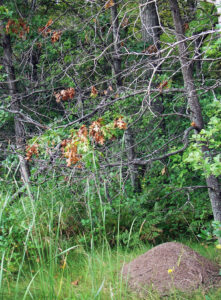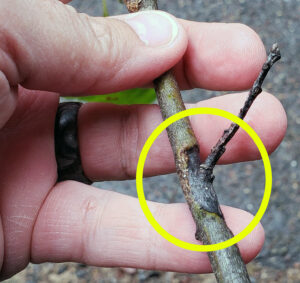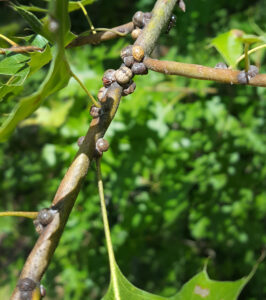
Dead branch tips on an oak tree caused by Kermes scale feeding. Note the ant mound in the lower right. Ants protect scale insects and collect sweet honeydew from the scales. / Photo Credit: Wisconsin DNR
By Linda Williams, DNR Forest Health specialist, Woodruff
Linda.Williams@wisconsin.gov or 920-360-0665
Botryosphaeria canker and kermes scale can cause symptoms that look similar at first glance. Both can cause the outer tips of branches to die, with leaves turning tan/brown while remaining attached to the branch.

An oak branch with a sunken canker (circled) from Botryosphaeria canker. / Photo Credit: Wisconsin DNR
Botryosphaeria
Branch tips killed by Botryosphaeria (Botryosphaeria sp.) will develop small, dark, black fungal fruiting structures that erupt through the bark of the twig. Or there may be a sunken canker at the base of the dying twig. There may also be discoloration in the sapwood beneath the canker. Dead leaves will remain on the twig.
Keeping trees healthy and minimizing wounds on branches will help minimize new Botryosphaeria infections.

Large, round Kermes scales feeding on an oak branch. / Photo Credit: Wisconsin DNR
Kermes Scale
Pin oak kermes scale (Allokermes galliformis) can also cause branch tips to die. Close examination near the base of the dying branch tip will show large, round, tan scale insects situated along the twig.
Kermes scales prefer to infest younger oaks and rarely cause problems on older trees. Kermes scale find it easier to attack trees that are under stress, so keeping trees healthy can help to minimize problems. Dead branch tips can be pruned out and disposed of.
Cicada damage, twig pruner damage and squirrel damage can also kill oak branch tips.
